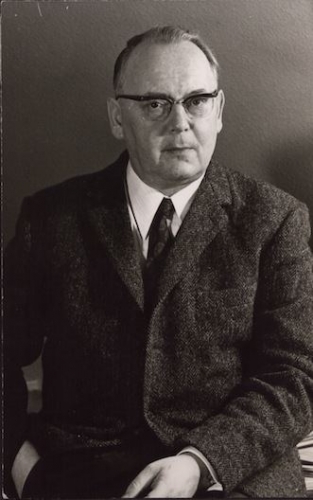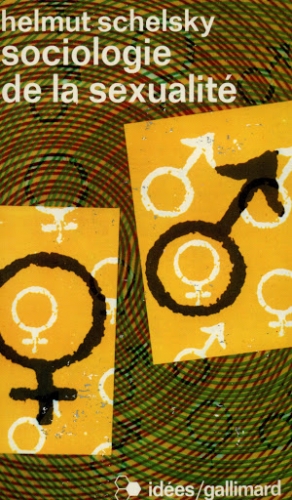dimanche, 22 mars 2020
Helmut Schelsky

Helmut Schelsky
Ex: https://alchetron.com
Helmut Schelsky (14 October 1912 – 24 February 1984), was a German sociologist, the most influential in post-World War II Germany, well into the 1970s.
Biography
Schelsky was born in Chemnitz, Saxony. He turned to social philosophy and even more to sociology, as elaborated at the University of Leipzig by Hans Freyer (the "Leipzig School"). Having earned his doctorate in 1935 (thesis [tr.]: The theory of community in the 1796 natural law by Fichte), in 1939 he qualified as a lecturer ("Habilitation") with a thesis on the political thought of Thomas Hobbes at the University of Königsberg. He was called up in 1941, so did not take up his first chair of Sociology at the (then German) Reichsuniversität Straßburg in 1944.
 After the fall of the Third Reich in 1945, Schelsky joined the German Red Cross and formed its effective Suchdienst (service to trace down missing persons). In 1949 he became a Professor at the Hamburg "Hochschule für Arbeit und Politik", in 1953 at Hamburg University, and in 1960 he went to the University of Münster. There he headed what was then the biggest West German centre for social research, in Dortmund.
After the fall of the Third Reich in 1945, Schelsky joined the German Red Cross and formed its effective Suchdienst (service to trace down missing persons). In 1949 he became a Professor at the Hamburg "Hochschule für Arbeit und Politik", in 1953 at Hamburg University, and in 1960 he went to the University of Münster. There he headed what was then the biggest West German centre for social research, in Dortmund.
In 1970, Schelsky was called to be a professor of sociology at the newly founded Bielefeld University (creating by the way the only German full "Faculty of Sociology", and the "Centre of Interdisciplinarian Research" ("Zentrum für Interdisziplinäre Forschung" [ZiF] at Rheda), planned to be a 'German Harvard'). However, his new university changed very much, due to the years of student unrest all over Europe and North America, so he returned to Münster in anger, in 1973, for another five years. Having been a busy and successful publisher and editor all his life, he wrote several more books, against the Utopian way to approach Sociology, as fostered by the Frankfurt School, and on the Sociology of Law, but died a broken man in 1984.
Schelsky and German sociology
The "Leipzig School" (the social philosopher Hans Freyer, the anthropologist Arnold Gehlen, the philosopher Gotthard Günther), rich in the talents of a first generation, was of strong theoretical influence on Schelsky. But Freyer also dreamt of building up a sociological think tank for the Third Reich - quite differently to most other sociologists, e. g. to the (outspoken) anti-Hitlerian Ferdinand Tönnies (University of Kiel) and to Leopold von Wiese (University of Cologne), and to the émigrés (e. g. to Karl Mannheim, and to the up-and-coming René König, Paul Lazarsfeld, Norbert Elias, Theodor Adorno, Rudolf Heberle, and Lewis A. Coser). Freyer's ambitions failed miserably, the Nazi power elite monopolizing ideology, but helped the talented (and former Nazi) student Schelsky in his first career steps.
 After the Second World War, no longer a National Socialist, Schelsky became a star of applied sociology, due to his great gift of anticipating social and sociological developments. He published books on the theory of institutions, on social stratification, on the sociology of family, on the sociology of sexuality, on the sociology of youth, on Industrial Sociology, on the sociology of education, and on the sociology of the university system. In Dortmund, he made the Social Research Centre a West German focus of empirical and theoretical studies, being especially gifted in finding and attracting first class social scientists, e.g. Dieter Claessens, Niklas Luhmann, and many more.
After the Second World War, no longer a National Socialist, Schelsky became a star of applied sociology, due to his great gift of anticipating social and sociological developments. He published books on the theory of institutions, on social stratification, on the sociology of family, on the sociology of sexuality, on the sociology of youth, on Industrial Sociology, on the sociology of education, and on the sociology of the university system. In Dortmund, he made the Social Research Centre a West German focus of empirical and theoretical studies, being especially gifted in finding and attracting first class social scientists, e.g. Dieter Claessens, Niklas Luhmann, and many more.
It helped that Schelsky was an outspoken liberal professor, without any ambition to create adherents - a rare bird among German mandarins. He helped another 17 sociologists qualify as lecturers (outnumbering in this any other professor in the Humanities and Social Sciences) and anticipated the boom in sociological chairs at German universities. Manning them, he was professionally even more successful than the outstanding remigrants René König (Cologne) and Otto Stammer (Berlin) - the Frankfurt School starting to be of influence only after 1968.
 Schelsky was able to design Bielefeld University as an innovative institution of the highest academic quality, both in research and in thought. But the fact that his own university had moved away from his ideas hit him hard. His later books, criticizing ideological sociology (very much acclaimed now by conservative analysts) and on the sociology of law (quite influential in the Schools of Law) kept up his reputation as an outstanding thinker, but fell out of grace with younger sociologists. Moreover, his fascinating analyses, being of highest practical value, went out of date for the same reason; only by 2000 did new sociologists start to read him again.
Schelsky was able to design Bielefeld University as an innovative institution of the highest academic quality, both in research and in thought. But the fact that his own university had moved away from his ideas hit him hard. His later books, criticizing ideological sociology (very much acclaimed now by conservative analysts) and on the sociology of law (quite influential in the Schools of Law) kept up his reputation as an outstanding thinker, but fell out of grace with younger sociologists. Moreover, his fascinating analyses, being of highest practical value, went out of date for the same reason; only by 2000 did new sociologists start to read him again.
References
Helmut Schelsky WikipediaHelmut Schelsky
Helmut Schelsky, né le 14 octobre 1912 à Chemnitz et mort le 24 février 1984 à Münster, est un sociologue allemand, l'un des plus célèbres de l'époque d'après-guerre.
Personnage controversé en raison de sa contribution au national-socialisme, Schelsky reste malgré tout un grand promoteur de la recherche empirique en sociologie. Professeur à l'université de Hambourg à partir de 1949, il sera - vingt ans plus tard - le cofondateur du plus grand département de sociologie en Allemagne à l'université de Bielefeld. Ses positions philosophiques et sociologiques dérivent du courant de l'anthropologie philosophique, de l'herméneutique et du conservatisme tels que ceux-ci furent représentés par ses maîtres: Hans Freyer, Theodor Litt et surtout Arnold Gehlen. Dans ses travaux, Schelsky s'intéresse notamment aux institutions, au droit et au pouvoir, à leur force de cohésion et de stabilité dans les sociétés industrialisées.
On lui doit une étude audacieuse sur la sexualité dans une perspective sociologique, la première du genre. Opposé aux sociologies critiques, Schelsky défend une sociologie de la réalité, du statu quo. Autrement dit ses travaux portent sur ce qui est et non à ce qui devrait ou pourrait être (d'où le primat pour les recherches empiriques). Déçu des nouvelles orientations prises par la sociologie durant les années 1970, Schelsky adoptera à la fin de sa vie une position qu'il nomme « anti-sociologique ».
00:53 Publié dans Sociologie, Théorie politique | Lien permanent | Commentaires (0) | Tags : helmut schelsky, sociologie, philosophie politique, politologie, sciences politiques, théorie politique, allemagne |  |
|  del.icio.us |
del.icio.us |  |
|  Digg |
Digg | ![]() Facebook
Facebook



Les commentaires sont fermés.